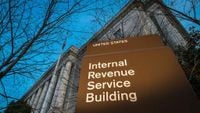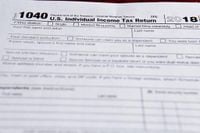As Tax Day approaches, millions of Americans are finalizing their federal income tax returns, with the deadline set for April 15, 2025. According to the Internal Revenue Service (IRS), nearly 90 million returns were filed as of March 28, 2025, marking a slight decrease from the previous year. For those still working on their returns or needing more time, understanding the extension process is crucial to avoid penalties and ensure compliance.
The IRS has reported that taxpayers can request a six-month extension to file their taxes, effectively pushing the deadline to October 15, 2025. However, it's important to note that this extension only applies to filing the return, not to paying any taxes owed. Taxpayers must estimate and pay their taxes by the original deadline to avoid incurring additional penalties.
For individuals who owe taxes, the penalties for not filing on time can be steep. The standard penalty is 5% of the unpaid tax due for each month the return is late, which can accumulate up to a maximum of 25%. If the return is more than 60 days late, a minimum penalty of $510 per month will be assessed if the 5% penalty is below that amount. "If you have a balance due, don’t file late because you will compound your problems," said Jim Buttonow, a CPA based in North Carolina.
Taxpayers in Florida who were affected by Hurricanes Milton, Helene, and Debby have until May 1, 2025, to file their returns, thanks to a disaster extension granted by the IRS. This extension applies to various federal individual and business tax returns and payments due during the affected period.
To apply for a tax extension, taxpayers have several options. They can file electronically through the IRS Free File system, which is available to all taxpayers. Alternatively, they can complete Form 4868 and submit it either online or by mail. If paying taxes, taxpayers can check a box indicating they are applying for an extension while making their payment, eliminating the need for a separate form.
For those who might underestimate their tax liability, the IRS has provisions to avoid underpayment penalties. If the filed return shows less than $1,000 owed, or if at least 90% of the current year's tax is paid, the taxpayer will not face penalties. This rule is applicable for individuals earning less than $150,000 annually.
Missing the tax deadline without requesting an extension can result in significant penalties. The failure-to-file penalty is 5% of the tax due for each month the return is late, while a smaller penalty of 0.5% applies if a return is filed but the taxes owed are not paid. If the IRS notifies a taxpayer of a failure-to-pay penalty, and the tax remains unpaid for 10 days, the penalty increases to 1% per month.
As of late March, the IRS had processed approximately 89.55 million tax returns for 2025, resulting in about $163 billion in refunds. This refund amount represents an increase from the previous year, with the average refund for 2025 currently sitting at around $3,170, a $120 increase from 2024.
For taxpayers who have not yet filed, the upcoming deadline serves as a reminder of the importance of timely filing. Not only does filing on time help avoid penalties, but it also ensures that any refunds owed are claimed. The IRS has noted that there remains over $1 billion in unclaimed refunds from 2021, with April 15, 2025, being the last opportunity to file for those refunds.
Furthermore, for self-employed individuals, failing to file a return can have long-term repercussions. Income not reported to the Social Security Administration means that credits toward Social Security retirement or disability benefits are not accumulated. This can impact future financial stability, especially for those who rely on these benefits.
In summary, with Tax Day just around the corner, taxpayers should take proactive steps to ensure they meet the deadline or file for an extension if necessary. Understanding the penalties for late filing and the importance of timely payments can significantly alleviate stress during this busy tax season.
As the IRS continues to process returns and issue refunds, taxpayers are encouraged to utilize available resources, including the IRS website and professional tax advisors, to navigate the complexities of tax filing and ensure compliance.








